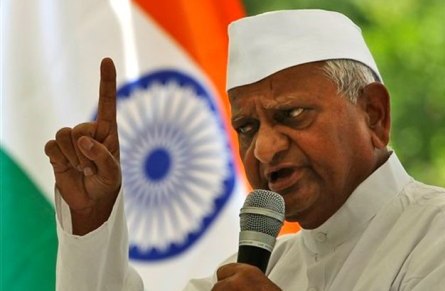
New Delhi, October 23: Anna Hazare Tuesday refused to defend India Against Corruption (IAC) activist Arvind Kejriwal on the allegations made by Congress leader Digvijay Singh but said will support his former associate if he fights election against a corrupt person.
"I won't protect Kejriwal on allegations made by Digvijay. I will support him if he fights election against a corrupt person," Anna told Headlines Today channel in an interview at his village Ralegan Siddhi in Maharashtra.
Congress general secretary Digvijay Singh Saturday posed 27 questions to Kejriwal about foreign funding of an NGO with which he is associated and alleged violation of service rules while he was an Indian Revenue Service (IRS) officer.
On Friday, Singh called Kejriwal a "self-serving ambitious megalomaniac with scant regard for democracy" and asked the activist why he "never raised" the issue of corruption in states ruled by the Bharatiya Janata Party (BJP).
Explaining his position on why he parted ways with Kejriwal, Hazare said: "Kejriwal did not reply my five questions including on funding of the new political outfit and identifying the candidates."
Kejriwal was told not to use my name in the yet to be named political outfit, he said.
Wishing him well, Hazare said: "I have no advise for him."
Hazare said he was in the process of re-launching his campaign for the anti-graft institution - Lokpal and was screening the potential members.
"We are working for the Lokpal and pro-people laws and are in the process to finalise the members after verifying their credentials," he said.
Hazare also said said that Prime Minister Manmohan Singh was a good man but "is remote controlled."





Comments
Add new comment